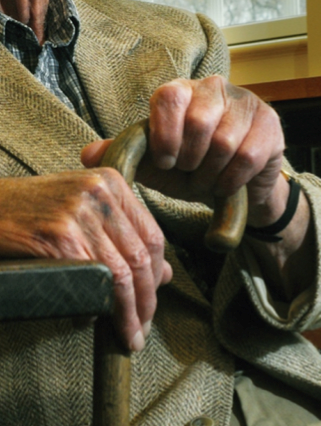North Shore seniors at risk of homelessness may have fewer places to turn this summer if Hollyburn Family Services Society can't shore up a funding shortfall expected to hit this June.
For the last three years, the United Way Lower Mainland has paid for 45 per cent of the costs incurred by Hollyburn's seniors outreach program. That arrangement came to an end in March, albeit with enough funding to keep the program running as is until June.
Hollyburn is canvassing for other funding, but if the society can't replace the annual $50,000 infusion formerly provided by the United Way, services will be reduced, according to executive director Nanette Taylor. "I won't be able to afford to cover the staff costs," she said.
Donations to the United Way have been flat or decreasing since 2008, according to United Way Lower Mainland president Michael McKnight. "Philanthropic dollars are going down so we have to say no to a lot more requests for funding," he said.
Donors contributed $27 million to United Way Lower Mainland last year, but the charity's focus is currently on Better At Home, a provincial program providing non-medical home support to seniors.
"We're investing more into seniors programs than we ever have in the history of our organization," he said.
McKnight praised Hollyburn and wished them luck in continuing their work. "The need will always be greater than the resources they have," he said.
The discontinued funding is a disappointment for Earl Holmes, 75.
Holmes said Hollyburn's services were essential when he ended up in the hospital with a shoulder injury, unsure of where he would live. "I don't know where I'd have turned," he said.
Besides rent and food, seniors are often paying thousands for necessities like hearing aids and dentures.
The federal government should probably do more to help out, according to Holmes.
"They are cutting services that are absolutely essential," he said. "What the hell do you think people live on?" Holmes praised the "hard working" staff at Hollyburn.
Besides its volunteers, the program is largely run by one outreach worker and co-ordinator Leya Eguchi.
"We basically triage," Eguchi said. "Nobody's turned away that's about to lose their housing tomorrow."
Taylor estimates the program gets about 20 calls a day from hospitals, police officers, shelters, as well as sons and daughters looking for help for their parents.
"Sometimes, literally, Lions Gate will be discharging them to the street and if we can't get them placed.. ." Taylor said.
In 2013, the program connected 242 seniors to mental health services. However, Taylor said the growing concern is the swelling number of seemingly average seniors who find themselves facing homelessness.
"We've had people that are just basically not making enough. They've been cobbling together what they can and then they just can't anymore," Eguchi said.
It's not unusual for the program to encounter a senior shelling out $1,200 in rent from an assisted income of $1,500. "They just eat through what they might have had," she said. "That's a reality for - I would say - thousands of North Shore seniors right now."
There are 2,500 seniors at risk of homelessness on the North Shore, according to a 2011 study in collaboration with Lionsview Seniors Society.
Hollyburn's work is a cost-saver in the long run, according to Taylor. The outreach keeps seniors in a stable situation as opposed to an emergency room or living on a beach at Ambleside. "By some early intervention, by the kind of work that we're doing, you can really save a lot of money," she said.
With fewer resources, more seniors may be at risk.
Taylor recalled a cancer-sufferer and his wife who were evicted. "They ended up living in their truck for three months before we got notification," she said.
Other seniors have spent the rent money on vet bills to help their ailing pet.
"They come to us after they pay the vet bills, not before," Eguchi said.



